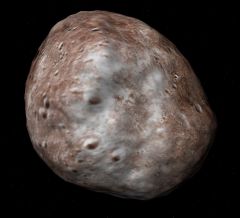1566 Icarus
1566 Icarus (1949 MA) is object and a stony type asteroid. It was discovered by Walter Baade on 27 June 1949 at the Palomar Observatory.
The orbit of Bacchus varies from about 0.19 to 1.97 AU, which takes Icarus closer to the Sun than Mercury and farther away than Mars, revolving in about 409 days. Eccentricity is 0.83 and inclination is 23° to the ecliptic.
Bacchus is a stony asteroid, about 1.61 km × 1.60 km × 1.17 km, mean radius is about 0.50 km.
1566 Icarus in Orbiter
Icarus was introduced to Orbiter with the release of Mercury_Crosser.zip in June 2005.
Note that the landing surface as given in the config file is spherical, but the visual of Icarus is not, if you land, you will likely be above or below the visual surface.
| Add-on | Source | Version | Author | Type | Release Date | Compatibility | Wiki article |
|---|---|---|---|---|---|---|---|
| Mercury Crosser Asteroids | O-F Resources | 2005-06-01 | Nighthawke | Scenery | 2 June 2005 | ||
See also
Gallery
| edit The Solar System | |
|---|---|
| Central star |
Sun (Sol) |
| Planets |
Mercury - Venus - Earth - Mars - Jupiter - Saturn - Uranus - Neptune |
| Natural satellites |
Moon - Phobos - Deimos - Io - Europa - Ganymede - Titan - more... |
| Add-ons |
Planets - Dwarf Planets - Small objects - Natural satellites - Alternative star systems |



